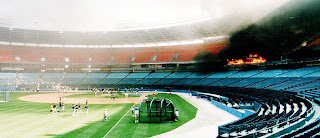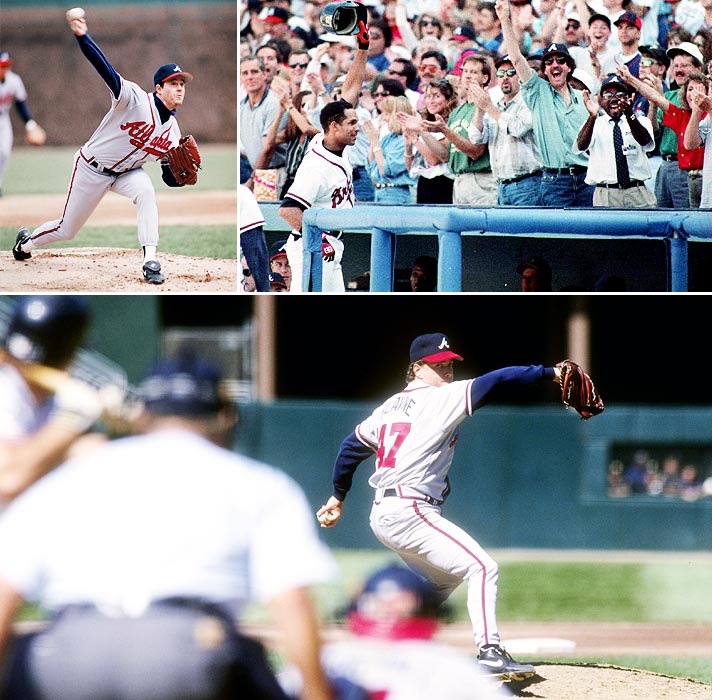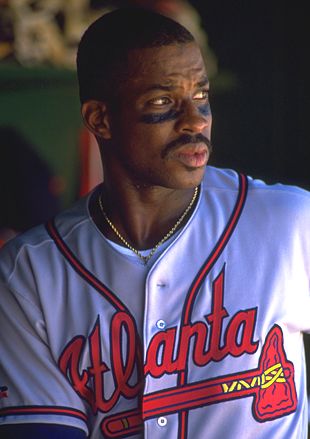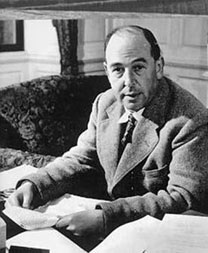Friday, September 28, 2007
Thursday, September 27, 2007
An Atlanta Braves Season to Remember
 Every season when the trade deadline approaches, Fred McGriff's name is invoked as the sine qua non of midseason deals. The acquisition came about mainly because the San Diego Padres, for whom McGriff had slugged 35 homers in 1992, fell apart after a strong third-place finish a year earlier. Drifting at 20 games under .500, the Padres decided to unload all their expensive pieces, including Greg Harris, Gary Sheffield and their first baseman, who was making $4.25 million. "I'm dangling out there, I know I'm going somewhere," McGriff told reporters. "I just hope it's to a team in a pennant race."
Every season when the trade deadline approaches, Fred McGriff's name is invoked as the sine qua non of midseason deals. The acquisition came about mainly because the San Diego Padres, for whom McGriff had slugged 35 homers in 1992, fell apart after a strong third-place finish a year earlier. Drifting at 20 games under .500, the Padres decided to unload all their expensive pieces, including Greg Harris, Gary Sheffield and their first baseman, who was making $4.25 million. "I'm dangling out there, I know I'm going somewhere," McGriff told reporters. "I just hope it's to a team in a pennant race."
Cue the theme from "Gone with the Wind." Braves general manager John Schuerholz had a prospect the Padres coveted, Melvin Nieves.
"We knew McGriff was the guy we wanted, and when we were willing to include Nieves, it came together," Schuerholz recalls. "Nieves was a big, strong kid, and a switch-hitter, too." Schuerholz tossed in two other minor leaguers, Donnie Elliott and Vincent Moore (who managed 31 major league games between them), and McGriff was a Brave. Giants GM Bob Quinn spoke for most of baseball when he said: "What bothers me is that San Diego didn't get more for him."
The trade was consummated July 18. Two days later, McGriff arrived for his first game in Atlanta. A roaring bonfire greeted him -- but this was no pep rally. Atlanta-Fulton County Stadium was ablaze.
Braves' radio broadcasters Matt Stewart, Pete Van Wieren and Don Sutton had a close-up view. "We noticed flames coming out of a booth belonging to radio sponsors, about three or four booths down," Stewart says. "A breeze had blown some sterno flames into curtains that had probably been there since the stadium opened in 1965. They went up like pine straw. Sutton grabbed us both and said, 'We gotta get out of here.' "
The fire quickly spread out of control. "Nobody could get in there, because the key was with the owner," Van Wieren says. The press room was evacuated. "We ran away from this thick black smoke, and like dummies got in the elevator," Stewart continues. "When we got to the field, I met Jane Fonda for the first time. She was there with Ted Turner. Suddenly, there was a huge boom, and I jumped 10 feet out of my skin. It was the same thing that happened in the [World] Trade Center on 9/11 -- the steel girders had melted from the heat, and the structure collapsed."

Mark Lemke was standing with fellow infielder and good buddy Jeff Blauser on the field when the blaze erupted. "We were just watching the flames, and suddenly there was a huge boom, and we went tearing out into center field," Lemke said. A photo of the two gazing in disbelief as the press box burns is in the Hall of Fame. Sid Bream, the Braves' first baseman who was about to lose his job with the arrival of McGriff, said of the blaze, "I know I'm the most likely suspect, but I swear I didn't do it."
"Ted Turner told me two things," Schuerholz remembers. "One, 'We're going to play this game.' We cordoned off a portion of the stands for the media -- we didn't have many fans that night -- and started about 90 minutes late. Then he said, 'The stadium's caught fire -- tonight, so will the Braves.' "
As with cable news and the mainstreaming of the buffalo burger, Turner had seen the future with unusual clarity. The Cardinals took a 5-0 lead, but McGriff smashed a long homer to tie it, and Atlanta scored three in the eighth to win. Nine-year-old Jeff Francoeur, now playing right field for the team, was watching at home in suburban Atlanta: "I remember that like it was yesterday. McGriff got here, and suddenly we were sure we would win it."
 But for the vagaries of travel, McGriff might have caught fire ... literally. "He was supposed to be [in the flambéed press box] for a news conference," Van Wieren recalls. "Whenever a new player arrived, he was brought upstairs for questions. But his plane was late, and he got to the park just in time for the game. He was told about it afterward, and he just kinda rolled his eyes."
But for the vagaries of travel, McGriff might have caught fire ... literally. "He was supposed to be [in the flambéed press box] for a news conference," Van Wieren recalls. "Whenever a new player arrived, he was brought upstairs for questions. But his plane was late, and he got to the park just in time for the game. He was told about it afterward, and he just kinda rolled his eyes."
The Crime Dog's impact was immediate and telling. He hit .422 with seven homers and 12 RBI in his first dozen games in Atlanta. "It balanced our offense," Schuerholz says. "The pressure was off hitters like [David] Justice and [Ron] Gant, who were trying to pretend they were cleanup hitters."
McGriff was pleasantly surprised by how loose the Braves were. "The first day I got there, they were playing putt-putt in the clubhouse." Two days after McGriff's arrival, the Braves lost to fall a full 10 games behind, but they ripped off their next six to announce they were back in the race.
Baker is still steamed about being misquoted in the wake of the deal. "I said 'I hope they got Fred too late,' but someone left out the word 'hope.' It went out everywhere like I was being cocky, but it was just a misprint." Sadly for Dusty, the Braves used the perceived slight as fuel for their run.
A less-remembered key to Atlanta's turnaround was the replacement of Mike Stanton as closer. Greg McMichael, a rookie who thought his career was over after several knee operations and his release by Cleveland, took over the role and immediately flourished. "His best pitch was a great changeup, and that eliminated lefty-righty matchups, because he could get either out with it," says Mazzone, then the Braves' pitching coach. McMichael was so effective in the late innings that he was featured in Sports Illustrated -- unfortunately, the accompanying photo was of Maddux.
The Giants attempted to make an impact deal at the deadline, too, but balked at Montreal's asking price for aging but cagey starter Dennis Martinez. The Expos wanted a top pitching prospect named Salomon "The Prophet" Torres. Unfortunately for Quinn, he didn't live up to Torres' nickname or he would have pulled the trigger.
The Efficacy of Prayer by C.S. Lewis

January 1959




